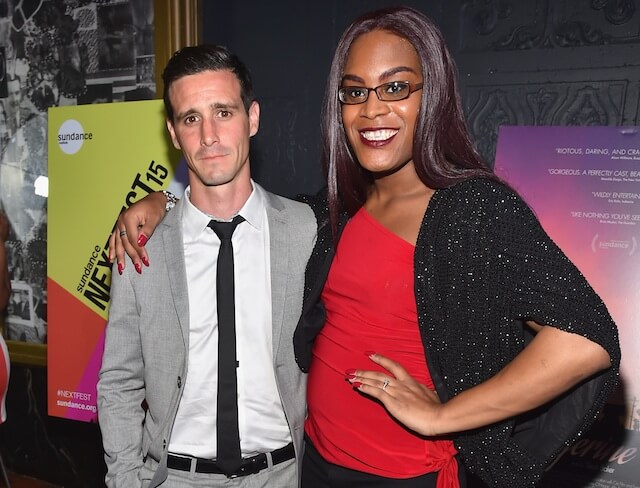Mya Taylor and James Ransone are tired. The day before we speak, the “Tangerine” stars had been among the revelers at New York City’s Pride March held the last weekend of June. They were on the float for their new film, a Sundance monster hit that’s a truly rare beast: a film about trans characters, played by trans performers. “It’s great if you don’t have to pee,” says Ransone, who plays a pimp cheating on a prostitute named Sin-Dee (played by Kitana Kiki Rodriguez).
“Considering the fact that I’m taking so many hormones, it’s hard on the body,” says Taylor, who plays Alexandra, Sin-Dee’s best friend and trans prostitute in arms. “My feet were tired.” They’re in New York, which in a sense isn’t too different from Los Angeles, where they and director Sean Baker shot “Tangerine.” Both are cities that once thrived with edgy life and fascinating subcultures. Los Angeles still has more of that than New York but, Ransone, claims it’s lagging just a few years behind in terms of losing it all. “There’s a lot of Eastern European and Chinese money coming in, buying up properties, especially in the area ‘Tangerine’ was shot in, in West Hollywood,” Ransone tells us. “They’re tearing up most of those single family homes and putting up huge apartment buildings.” “Donut Time is the last thing that’s there,” Taylor says, referring to the tiny, mom-and-pop outfit that serves as one of the film’s key locations. “All the old landmarks in that area are gone. There was a Del Taco across the street, there was a little bookstore.” The Del Taco is now a Wallgreen’s — Taylor says, “for all the people in their new apartments to get their medicines.” As such, “Tangerine,” shot over four weeks last year, is a kind of time capsule, both in the Los Angeles it shows and in the way it recalls scrappy, low budget indies made with affordable equipment from the early 1990s. Indeed, just as big a hook as being a film with trans stars is that it was filmed with an iPhone, giving it a mobile, loose feel. “This part of the story often gets eclipsed, because it doesn’t fall into the sound bit territory. But it still cost a lot to color-correct it,” Ransone explains. “We still put the same amount in post as we would have had we shot in on a Red camera on a 35mm camera.” Taylor doesn’t feel that being filmed by someone wielding a palm-sized gadget made it feel easier. “I just filmed another movie with a really big camera, and I just didn’t see any difference,” she tells us. “I guess I’m just gifted like that.” Taylor is a seasoned club performer but was not prepared for filming on the cheap for long days. “One day I was there for 14 hours, and I had to be up super early the next day. I didn’t get home till like 4.” Ransone is one of the cast’s few professional actors, perhaps best known for playing out-of-control Ziggy on the second season of “The Wire,” as well as a key role in the forthcoming “Sinister 2.” Still, it’s small work that interests him. “I’m not deluded about movies as a business,” he says. “But when you look at any kind of big box office fare, it just reminds you it’s the same as our restaurant choices. It’s Applebee’s and T.G.I. Friday’s and P.F. Chang’s. I eat that and say, ‘I guess that was Chinese food.’ But it still leaves a salty, s—y taste in my mouth. I was really happy that ‘Mad Max’ did really well. I liked that I heard George Miller’s voice. I heard one person telling a story, as opposed to this cacophony of studio executives trying to appeal to everyone.” Still, “Tangerine” has been getting huge buzz since its Sundance premiere, to the shock of Taylor, especially. “I did it because I hadn’t done anything like it before,” Taylor recalls. “I never in a million years thought it would be this. My boyfriend at the time kept saying, ‘This will be your ticket into the industry!’ And I was like, ‘OK…’” “I’m glad ‘Tangerine floated to the surface. We could have easily gotten buried by everything else,” Ransone says. Part of that has to do with the popularity of trans actress Laverne Cox on “Orange is the New Black” and the warm welcome received by Caitlyn Jenner. “When you look at Sean’s entire body of work, it just so happens we made a movie about this particular subject matter as the zeitgeist got interested in it. It’s dumb luck this movie landed when it did. Because Sean would have made this movie anyway,” Ransone says. Baker’s last film, “Starlet,” also featuring him, also dealt with an ignored subculture, namely porn actors. “Sean has been able to bring down to a ground level this humanistic approach to marginalized people that otherwise go unnoticed.” The transgendered community is among the last wholly ignored groups, classically reduced to easy jokes (as in, most recently, “Ted 2”), if paid attention to at all. Asked how she views the recent wave of attention paid to trans people, Taylor says, “I feel wonderful, but the next question you’re going to ask me is if I feel there’s progress,” she says, belying having fielded such questions for months. “I think there has been progress but there’s still more to do.” Asked about her theories why people have suddenly been very accepting, she just says, “I don’t know! I really don’t know. I guess people are realizing this is 2015.”Along similar lines, the tide has turned in favor of same-sex marriage, albeit with a handful still opposing it, they say, on religious grounds. “I don’t understand: why are people so against it? If they were so religious they wouldn’t be judging other people.” Part of that, of course, might have to do with a generation who’s grown up thinking non-heteronormative ways of living aren’t unusual. “What’s weird is I feel a generational gap with younger kids,” Ransone admits. “The kids coming up behind us, their approach to the whole thing is incredible. They see it in such a ‘you love who you love’ way. It’s amazing.”
Mya Taylor and James Ransone on ‘Tangerine’ and marginalized cultures

Getty Images
Follow Matt Prigge on Twitter @mattprigge


















